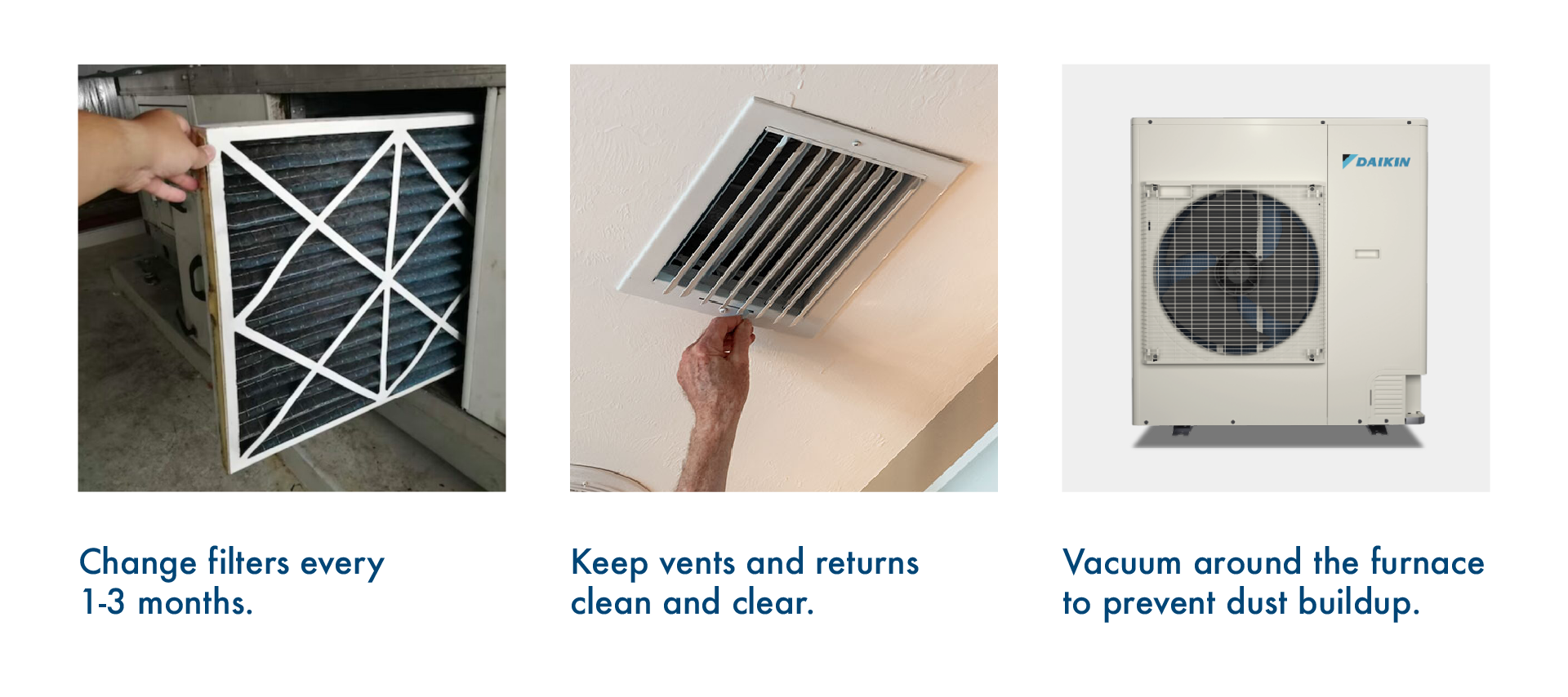Problem 1: Dirty or Clogged Filters
The Issue
Air filters trap dust, dirt, and allergens. Over time, they clog up and restrict airflow. This forces your furnace to work harder, which can cause overheating, short cycling, and higher energy bills.
Warning Signs
- Weak airflow from vents.
- Furnace cycling on and off too quickly.
- Rising utility bills.
The Fix
Replace filters every 1–3 months. If you have pets or allergies, you may need to change them more often.
Problem 2: Pilot Light or Ignition Failure
The Issue
Older gas furnaces use a pilot light, while newer models often use electronic ignition systems. If either fails, your furnace won’t be able to start heating.
Warning Signs
- Furnace doesn’t turn on at all.
- Pilot light is yellow or keeps going out.
- Clicking sound but no ignition.
The Fix
- Relight the pilot light if you’re comfortable doing so.
- For repeated ignition failures, call an HVAC technician—this may point to a faulty thermocouple (aka thermoelectrical thermometer), dirty burners, or control board issues.
⚠️ Safety Note: Never attempt DIY gas repairs. If you smell gas, shut off your system and call a professional immediately.
Problem 3: Thermostat Malfunctions
The Issue
Your thermostat is the “brain” of your heating system. If it’s not working correctly, your furnace won’t cycle properly.
Warning Signs
- Furnace won’t turn on even though the thermostat is set.
- Inaccurate temperature readings.
- Furnace cycles too often or not enough.
The Fix
- Replace batteries.
- Make sure the thermostat is set to “heat.”
- Consider upgrading to a smart thermostat for better accuracy and efficiency.
Problem 4: Strange Noises
The Issue
Furnaces make some noise, but unusual sounds usually signal a problem.
Common Sounds & Causes
- Banging or popping: Dirty burners or expanding ductwork.
- Squealing: Worn blower motor belt.
- Rattling: Loose panels or components.
- Grinding: Motor bearings may be failing.
The Fix
Tighten loose screws, but call an HVAC professional for mechanical noises—continuing to run the furnace could cause more damage.
Problem 5: Frequent Cycling (Short Cycling)
The Issue
If your furnace keeps turning on and off quickly, it’s called “short cycling.” This wastes energy and causes wear and tear.
Possible Causes
- Dirty air filter.
- Improper furnace sizing.
- Thermostat issues.
- Overheating due to blocked vents.
The Fix
Start with the simple solution—replace the filter. If the issue continues, you’ll need a professional inspection.
Problem 6: Furnace Blowing Cold Air
The Issue
Few things are more frustrating than a furnace running but not producing heat.
Possible Causes
- Pilot light is out.
- Thermostat set to “fan only.”
- Dirty flame sensor.
- Overheating causing safety shut-offs.
The Fix
Check thermostat settings first. If it’s not the thermostat, call for service—the problem likely requires professional cleaning or repair.
Problem 7: Carbon Monoxide Leaks
The Issue
This is the most serious furnace problem. Cracks in the heat exchanger can leak carbon monoxide (CO), an odorless, deadly gas.
Warning Signs
- Pilot light flame turns yellow.
- Headaches, nausea, or dizziness in your household.
- Furnace frequently shuts down.
The Fix
Turn off your furnace immediately and call a professional. Install CO detectors on every floor of your home to protect your family.
Problem 8: Worn-Out or Aging Parts
The Issue
Over time, parts like blower motors, belts, bearings, and limit switches simply wear out.
Warning Signs
- Reduced performance.
- Frequent repairs.
- Furnace is more than 15 years old.
The Fix
Replacing individual components can buy you time, but eventually, a full furnace replacement is the smarter choice for efficiency and reliability.
Preventing Furnace Problems: Maintenance is Key
Most furnace problems can be prevented—or at least delayed—with regular maintenance.
DIY Tasks

Professional Maintenance
Schedule annual inspections with a certified San Antonio HVAC technician. They’ll clean burners, test safety switches, check for leaks, and ensure your furnace runs efficiently.
When to Repair vs. Replace
Wondering if it’s worth fixing your furnace? Consider the 50% rule:
- If the repair costs more than 50% of the price of a new furnace, replacement is usually the smarter move.
Other replacement indicators:
- Furnace is over 15–20 years old.
- Energy bills keep rising.
- You’ve had multiple breakdowns in the past two years.
FAQs About Furnace Problems
Q: Why does my furnace smell like burning dust when I first turn it on?
A: That’s normal—dust that settled during the off-season burns off when the furnace starts. The smell should fade quickly.
Q: Can I run my furnace without a filter temporarily?
A: It’s not recommended. Running without a filter allows dust to clog internal components and reduces air quality.
Q: How often should I have my furnace checked?
A: Once a year is best—ideally in the fall before cold weather arrives.
Conclusion: Stay Ahead of Furnace Problems
Most furnace issues start small—dirty filters, worn belts, a pilot light that won’t stay lit. But left unchecked, they can spiral into costly repairs or even safety hazards.
The key is prevention: change filters, schedule annual tune-ups, and pay attention to warning signs. And when in doubt, trust a local expert.
👉 At Stay Cool SATX, we provide reliable furnace repair in San Antonio to keep your home warm and safe. Whether it’s a quick fix or a full system replacement, our technicians have you covered. Call today to schedule your heating service!
